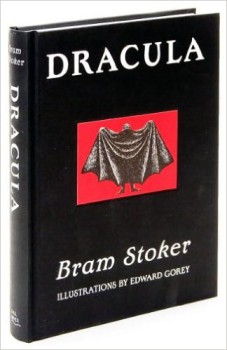Dracula: The Definitive Edition
NOTE: The following article was first published on January 17, 2010. Thank you to John O’Neill for agreeing to reprint these first 20 articles, so they are archived at Black Gate which has been my home for over 5 years and 250 articles now. Thank you to Deuce Richardson without whom I never would have found my way. Minor editorial changes have been made in some cases to the original text.
 Dracula by Bram Stoker is the subject of my very first article as a blogger. I follow several book review blogs, but had mixed feelings about starting my own. Blogs serve no useful purpose save providing a few minutes of distraction from the mundane. As a result, they are fairly inconsequential in the Grand Scheme of Life, but infinitely more useful than a politician.
Dracula by Bram Stoker is the subject of my very first article as a blogger. I follow several book review blogs, but had mixed feelings about starting my own. Blogs serve no useful purpose save providing a few minutes of distraction from the mundane. As a result, they are fairly inconsequential in the Grand Scheme of Life, but infinitely more useful than a politician.
Dracula is slowly gaining acceptance in literary circles as more than just a genre classic and deservedly so. Of course, mass acceptance for a novel that has never been out of print in its 118 years on the planet means that there are literally hundreds of public domain copies to choose from for the unwary consumer. The focus of this review is on Dracula: The Definitive Edition available from Fall River Press. This edition is recommended not only for Edward Gorey’s fine illustrations and Marvin Kaye’s impressive essays and notes on the text, but it is also affordably priced.
This gets my nod over the many annotated editions out there for the simple fact that Mr. Kaye gives the modern reader all they need to know to enjoy the novel in the context it was written without getting bogged down endlessly in railway timetables and notes on Transylvanian culture, cuisine, superstition, or topography. Nor does he become sidetracked in speculation on Stoker’s marriage, sex life, or physical and mental health. Mr. Kaye provides the salient biographical details and expounds on details that are relevant to better appreciating the text and nothing more. His essays are a model of efficiency and stand on the strength of their factual accuracy above the more verbose and salacious theories one comes to expect with literary classics.